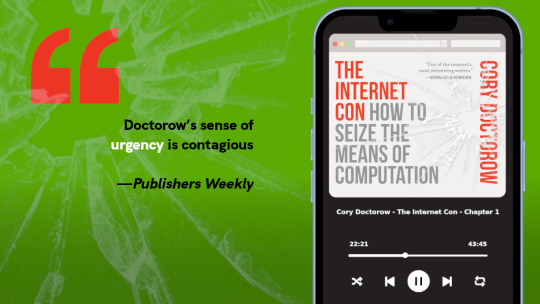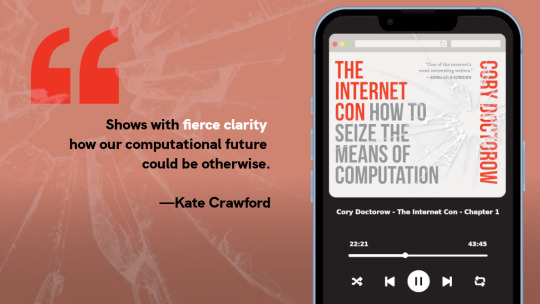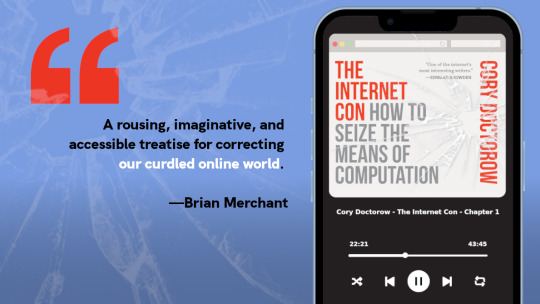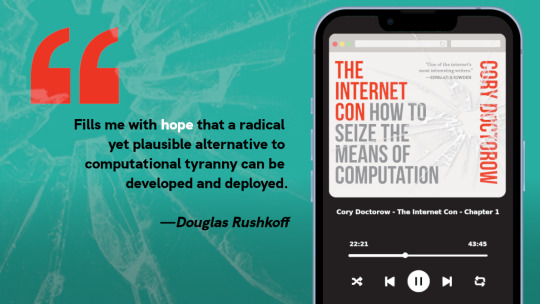#audiobooks
Explore tagged Tumblr posts
Text

Desperately trying to finish listening to this audiobook before Libby repos my shit
#thought I could get away with putting my phone on airplane mode#learned that lesson the hard way#last 10% of Creation Lake I still yearn for you#Libby#library#audiobooks#personal work#doodles
2K notes
·
View notes
Text


Cynthia Erivo will narrate a new audiobook of “Wicked: The Life and Times of the Wicked Witch of the West” by Gregory Maguire. The audiobook will be released on July 1st.
#wicked#wicked movie#wicked the life and times of the wicked witch of the west#gregory maguire#cynthia erivo#elphaba thropp#gelphie#galinda upland#glinda upland#wicked the musical#ariana grande#dailygrande#audiobooks
56 notes
·
View notes
Text
Finally started the Gideon the Ninth audiobook yesterday on a long walk. Even though I’ve read the whole series multiple times, I had held off.
But y’all were right, it’s great. Moira Quirk is fantastic.
However. Why did no one tell me she pronounces Palamedes like it rhymes with calamities?
24 notes
·
View notes
Text
My dear friends: When a librarian or teacher says "Audiobooks count as reading", we do not literally mean that audiobooks are the same as decoding visual meaning via symbols representing sounds. We mean, among other things:
Audiobooks can expose listeners to new vocabulary and forms of syntax.
Audiobooks can present listeners with long-form fictional narratives with engaging characters, interesting literary devices, and poetic turns of phrase.
Audiobooks can teach listeners new information in a long-form manner that goes into depth or wide breadth on a particular subject or subjects.
Audiobooks can help listeners' verbal comprehension skills.
Audiobooks can do all these things without presenting the same difficulties to blind, low vision, partially sighted, visually impaired, or dyslexic listeners; listeners with ADHD; listeners who experience physical difficulty with holding a book or e-reader; or listeners who are disabled in a host of other ways that a physical book or e-reader might present.
The written word is not specially imbued with magical noble worth above the spoken word, and if you think it is, you may have some ableism and/or racism to deconstruct.
#audiobooks#audiobooks count as reading#librarians of tumblr#adult literacy#children's literacy#reading comprehension#bookblr#booklr#books and reading#librarians#books & libraries#public libraries#reading#child literacy#school librarians
9K notes
·
View notes
Text
so. i understand where the sentiment "listening to an audiobook is the same thing as reading the book" is coming from - i mean, yes, the bottom line is you are taking in the same words in what is possibly a more accessible (or maybe just more enjoyable) format for you! and i'm 100% in agreement that "book snobs" who say "no you didn't really read it" if you listened to the audiobook are full of shit. ofc you should engage with stories in whatever way works for you, there is no moral or intellectual superiority to reading words off a page vs. listening to them
but it also is different? an audiobook is a performance. choices a narrator makes about line readings can drastically influence the meaning of the lines. even just different voices, accents, etc. - there are creative choices being made by the person delivering the words to you, and that affects your experience of the story in a different way than if you were making those choices in your own head. it might even change the way you visualize what's going on!
this isn't a bad thing it's just An Actual Thing & i think it's worth talking about. it rubs me the wrong way when people act like accommodations (and for many people audiobooks are an accommodation) always result in a completely identical experience, or even that they should, & if you suggest that people accessing media in different ways are having different experiences it's somehow ableist
anyway on rare occasions i really enjoy audiobooks but mostly they are much less accessible to me than words on a page (i need to be able to reread, flip back and forth, go at my own pace) & i also just really strongly prefer to encounter a text on my own before hearing someone else's performance of it, if possible! again i don't think it's "better" to read a physical book i just think it is a Distinct form of experiencing a story & acting like the two things are entirely the same is sort of doing a disservice to both
#rambling thoughts#audiobooks#was talking to jey about this the other day & that helped me clarify what i've been musing on#i really truly think people should read in whatever way they can. listening or using an e-reader or holding a physical book#i always always want to hold the book but i don't think i'm fucking superior for it lmao
4K notes
·
View notes
Text
help it's reobsessed me with my own book and now I can't stop thinking about things post story
god help me when I'm back on deadline for another book and have to try thinking about other characters good lord
David Sweeney-Bear what have you done to my BRAIN

I started listening to my own audiobook and BYE I'm gonna cry, I'm so happy we got this narrator 🥹
29 notes
·
View notes
Text
Kickstarting a book to end enshittification, because Amazon will not carry it

My next book is The Internet Con: How to Seize the Means of Computation: it’s a Big Tech disassembly manual that explains how to disenshittify the web and bring back the old good internet. The hardcover comes from Verso on Sept 5, but the audiobook comes from me — because Amazon refuses to sell my audio:
https://www.kickstarter.com/projects/doctorow/the-internet-con-how-to-seize-the-means-of-computation
Amazon owns Audible, the monopoly audiobook platform that controls >90% of the audio market. They require mandatory DRM for every book sold, locking those books forever to Amazon’s monopoly platform. If you break up with Amazon, you have to throw away your entire audiobook library.
That’s a hell of a lot of leverage to hand to any company, let alone a rapacious monopoly that ran a program targeting small publishers called “Project Gazelle,” where execs were ordered to attack indie publishers “the way a cheetah would pursue a sickly gazelle”:
https://www.businessinsider.com/sadistic-amazon-treated-book-sellers-the-way-a-cheetah-would-pursue-a-sickly-gazelle-2013-10

[Image ID: Journalist and novelist Doctorow (Red Team Blues) details a plan for how to break up Big Tech in this impassioned and perceptive manifesto….Doctorow’s sense of urgency is contagious -Publishers Weekly]
I won’t sell my work with DRM, because DRM is key to the enshittification of the internet. Enshittification is why the old, good internet died and became “five giant websites filled with screenshots of the other four” (h/t Tom Eastman). When a tech company can lock in its users and suppliers, it can drain value from both sides, using DRM and other lock-in gimmicks to keep their business even as they grow ever more miserable on the platform.
Here is how platforms die: first, they are good to their users; then they abuse their users to make things better for their business customers; finally, they abuse those business customers to claw back all the value for themselves. Then, they die:
https://pluralistic.net/2023/01/21/potemkin-ai/#hey-guys

[Image ID: A brilliant barn burner of a book. Cory is one of the sharpest tech critics, and he shows with fierce clarity how our computational future could be otherwise -Kate Crawford, author of The Atlas of AI”]
The Internet Con isn’t just an analysis of where enshittification comes from: it’s a detailed, shovel-ready policy prescription for halting enshittification, throwing it into reverse and bringing back the old, good internet.
How do we do that? With interoperability: the ability to plug new technology into those crapulent, decaying platform. Interop lets you choose which parts of the service you want and block the parts you don’t (think of how an adblocker lets you take the take-it-or-leave “offer” from a website and reply with “How about nah?”):
https://www.eff.org/deeplinks/2019/07/adblocking-how-about-nah
But interop isn’t just about making platforms less terrible — it’s an explosive charge that demolishes walled gardens. With interop, you can leave a social media service, but keep talking to the people who stay. With interop, you can leave your mobile platform, but bring your apps and media with you to a rival’s service. With interop, you can break up with Amazon, and still keep your audiobooks.
So, if interop is so great, why isn’t it everywhere?
Well, it used to be. Interop is how Microsoft became the dominant operating system:
https://www.eff.org/deeplinks/2019/06/adversarial-interoperability-reviving-elegant-weapon-more-civilized-age-slay

[Image ID: Nobody gets the internet-both the nuts and bolts that make it hum and the laws that shaped it into the mess it is-quite like Cory, and no one’s better qualified to deliver us a user manual for fixing it. That’s The Internet Con: a rousing, imaginative, and accessible treatise for correcting our curdled online world. If you care about the internet, get ready to dedicate yourself to making interoperability a reality. -Brian Merchant, author of Blood in the Machine]
It’s how Apple saved itself from Microsoft’s vicious campaign to destroy it:
https://www.eff.org/deeplinks/2019/06/adversarial-interoperability-reviving-elegant-weapon-more-civilized-age-slay
Every tech giant used interop to grow, and then every tech giant promptly turned around and attacked interoperators. Every pirate wants to be an admiral. When Big Tech did it, that was progress; when you do it back to Big Tech, that’s piracy. The tech giants used their monopoly power to make interop without permission illegal, creating a kind of “felony contempt of business model” (h/t Jay Freeman).
The Internet Con describes how this came to pass, but, more importantly, it tells us how to fix it. It lays out how we can combine different kinds of interop requirements (like the EU’s Digital Markets Act and Massachusetts’s Right to Repair law) with protections for reverse-engineering and other guerrilla tactics to create a system that is strong without being brittle, hard to cheat on and easy to enforce.
What’s more, this book explains how to get these policies: what existing legislative, regulatory and judicial powers can be invoked to make them a reality. Because we are living through the Great Enshittification, and crises erupt every ten seconds, and when those crises occur, the “good ideas lying around” can move from the fringes to the center in an eyeblink:
https://pluralistic.net/2023/06/12/only-a-crisis/#lets-gooooo

[Image ID: Thoughtfully written and patiently presented, The Internet Con explains how the promise of a free and open internet was lost to predatory business practices and the rush to commodify every aspect of our lives. An essential read for anyone that wants to understand how we lost control of our digital spaces and infrastructure to Silicon Valley’s tech giants, and how we can start fighting to get it back. -Tim Maughan, author of INFINITE DETAIL]
After all, we’ve known Big Tech was rotten for years, but we had no idea what to do about it. Every time a Big Tech colossus did something ghastly to millions or billions of people, we tried to fix the tech company. There’s no fixing the tech companies. They need to burn. The way to make users safe from Big Tech predators isn’t to make those predators behave better — it’s to evacuate those users:
https://pluralistic.net/2023/07/18/urban-wildlife-interface/#combustible-walled-gardens
I’ve been campaigning for human rights in the digital world for more than 20 years; I’ve been EFF’s European Director, representing the public interest at the EU, the UN, Westminster, Ottawa and DC. This is the subject I’ve devoted my life to, and I live my principles. I won’t let my books be sold with DRM, which means that Audible won’t carry my audiobooks. My agent tells me that this decision has cost me enough money to pay off my mortgage and put my kid through college. That’s a price I’m willing to pay if it means that my books aren’t enshittification bait.
But not selling on Audible has another cost, one that’s more important to me: a lot of readers prefer audiobooks and 9 out of 10 of those readers start and end their searches on Audible. When they don’t find an author there, they assume no audiobook exists, period. It got so bad I put up an audiobook on Amazon — me, reading an essay, explaining how Audible rips off writers and readers. It’s called “Why None of My Audiobooks Are For Sale on Audible”:
https://pluralistic.net/2022/07/25/can-you-hear-me-now/#acx-ripoff

[Image ID: Doctorow has been thinking longer and smarter than anyone else I know about how we create and exchange value in a digital age. -Douglas Rushkoff, author of Present Shock]
To get my audiobooks into readers’ ears, I pre-sell them on Kickstarter. This has been wildly successful, both financially and as a means of getting other prominent authors to break up with Amazon and use crowdfunding to fill the gap. Writers like Brandon Sanderson are doing heroic work, smashing Amazon’s monopoly:
https://www.brandonsanderson.com/guest-editorial-cory-doctorow-is-a-bestselling-author-but-audible-wont-carry-his-audiobooks/
And to be frank, I love audiobooks, too. I swim every day as physio for a chronic pain condition, and I listen to 2–3 books/month on my underwater MP3 player, disappearing into an imaginary world as I scull back and forth in my public pool. I’m able to get those audiobooks on my MP3 player thanks to Libro.fm, a DRM-free store that supports indie booksellers all over the world:
https://blog.libro.fm/a-qa-with-mark-pearson-libro-fm-ceo-and-co-founder/
Producing my own audiobooks has been a dream. Working with Skyboat Media, I’ve gotten narrators like @wilwheaton, Amber Benson, @neil-gaiman and Stefan Rudnicki for my work:
https://craphound.com/shop/

[Image ID: “This book is the instruction manual Big Tech doesn’t want you to read. It deconstructs their crummy products, undemocratic business models, rigged legal regimes, and lies. Crack this book and help build something better. -Astra Taylor, author of Democracy May Not Exist, but We’ll Miss It When Its Gone”]
But for this title, I decided that I would read it myself. After all, I’ve been podcasting since 2006, reading my own work aloud every week or so, even as I traveled the world and gave thousands of speeches about the subject of this book. I was excited (and a little trepedatious) at the prospect, but how could I pass up a chance to work with director Gabrielle de Cuir, who has directed everyone from Anne Hathaway to LeVar Burton to Eric Idle?
Reader, I fucking nailed it. I went back to those daily recordings fully prepared to hate them, but they were good — even great (especially after my engineer John Taylor Williams mastered them). Listen for yourself!
https://archive.org/details/cory_doctorow_internet_con_chapter_01
I hope you’ll consider backing this Kickstarter. If you’ve ever read my free, open access, CC-licensed blog posts and novels, or listened to my podcasts, or come to one of my talks and wished there was a way to say thank you, this is it. These crowdfunders make my DRM-free publishing program viable, even as audiobooks grow more central to a writer’s income and even as a single company takes over nearly the entire audiobook market.
Backers can choose from the DRM-free audiobook, DRM-free ebook (EPUB and MOBI) and a hardcover — including a signed, personalized option, fulfilled through the great LA indie bookstore Book Soup:
https://www.kickstarter.com/projects/doctorow/the-internet-con-how-to-seize-the-means-of-computation
What’s more, these ebooks and audiobooks are unlike any you’ll get anywhere else because they are sold without any terms of service or license agreements. As has been the case since time immemorial, when you buy these books, they’re yours, and you are allowed to do anything with them that copyright law permits — give them away, lend them to friends, or simply read them with any technology you choose.
As with my previous Kickstarters, backers can get their audiobooks delivered with an app (from libro.fm) or as a folder of MP3s. That helps people who struggle with “sideloading,” a process that Apple and Google have made progressively harder, even as they force audiobook and ebook sellers to hand over a 30% app tax on every dollar they make:
https://www.kickstarter.com/projects/doctorow/red-team-blues-another-audiobook-that-amazon-wont-sell/posts/3788112
Enshittification is rotting every layer of the tech stack: mobile, payments, hosting, social, delivery, playback. Every tech company is pulling the rug out from under us, using the chokepoints they built between audiences and speakers, artists and fans, to pick all of our pockets.
The Internet Con isn’t just a lament for the internet we lost — it’s a plan to get it back. I hope you’ll get a copy and share it with the people you love, even as the tech platforms choke off your communities to pad their quarterly numbers.

Next weekend (Aug 4-6), I'll be in Austin for Armadillocon, a science fiction convention, where I'm the Guest of Honor:
https://armadillocon.org/d45/

If you'd like an essay-formatted version of this thread to read or share, here's a link to it on pluralistic.net, my surveillance-free, ad-free, tracker-free blog:
https://pluralistic.net/2023/07/31/seize-the-means-of-computation/#the-internet-con

[Image ID: My forthcoming book 'The Internet Con: How to Seize the Means of Computation' in various editions: Verso hardcover, audiobook displayed on a phone, and ebook displayed on an e-ink reader.]
#pluralistic#trustbusting#big tech#gift guide#kickstarter#the internet con#books#audiobooks#enshitiffication#disenshittification#crowdfunders#seize the means of computation#audible#amazon#verso
15K notes
·
View notes
Text

My cartoon for this week’s Guardian books.
2K notes
·
View notes
Text
Please read this. It is deeply, DEEPLY freakish.
[Robin, a librarian] received a message from a patron of her library system that there was something wrong with an audiobook they had borrowed. The patron reported that during a quiet part of the audio, there seemed to be a tiny portion of another recording inserted into the silence. It happened more than a few times and the patron also provided a timestamp, because this patron is very awesome. Robin says that this isn’t unusual, and the process is pretty routine: “It’s usually just a corrupted file transfer or something. And we contact the publisher and let them know, or let OverDrive know, and it gets re-uploaded.” So then what happened? Robin: “So I went to look up the specific book to see who the publisher was. Mostly because I wanted to know. We would contact OverDrive about the error, and they would fix, or talk to the publisher directly.” Digital files get corrupted often enough, so this isn’t alarming. But then, Robin and her coworkers noticed the name of the narrator: “Scarlett Synthesized Voice.”
And that's just the beginning of it. Who is "author" Blake Pierce, and how do they have more than seven hundred books??
2K notes
·
View notes
Text
Anon is visually impaired and listens to a lot of audiobooks, but people have told them that audiobooks don't really count as "real books."
–
We ask your questions so you don’t have to! Submit your questions to have them posted anonymously as polls.
#polls#incognito polls#anonymous#tumblr polls#tumblr users#questions#polls about interests#submitted june 27#books#reading#audiobooks#disability#accessibility
886 notes
·
View notes
Text
Hi Tumblr!
It's time for your occasional reminder that I have a bandcamp, where I publish a bunch of my own audiobooks, independently produced, without DRM.
These are short stories and collections that are too small for mainstream publishing, so I published them myself. I think they're pretty great, and I hope you'll check them out if you enjoy my work.
642 notes
·
View notes
Text
Disadvantages of audiobooks: hard to pay attention to sometimes, can't always understand everything that's said, no idea how things are spelled
Advantages of audiobooks: this
God bless you, Moira Quirk.
Transcript:
"No," said Dulcinea. "Oh, no no no. Stay awake."
Gideon couldn't say anything but blearrghhh, mainly because blood was coming enthusiastically out of every hole in her face.
🇵🇸 Gaza Funds 🇵🇸
#meant to add the transcript earlier but i didn't have the printed copy handy#mostly because i really wanted to know how that sound was spelled#as a transcription “blearrghhh” is at once completely accurate but also entirely underwhelming#the locked tomb#tlt spoilers#(possibly)#gideon the ninth#moira quirk#video#audiobooks#gideon nav#dulcinea septimus
2K notes
·
View notes
Text
Reblog for sample
594 notes
·
View notes
Text
Just making a separate post on the Limbus Library for now, though looking through Project Gutenberg and LibriVox is pretty great too. So here's a full list in the order of the Cantos :)
-Metamorphosis (Book & Audiobook)
-Crime and Punishment (Book & Audiobook)
-Demian (Book & Audiobook)
-The Wings (Book & Audiobook)
-Moby Dick (Book & Audiobook)
-Wuthering Heights (Book & Audiobook)
-Don Quixote (Book & Audiobook)
-Dream of the Red Chamber (Book & Audiobook (& bonus drama series))
-Hell Screen (Book & Audiobook)
-The Stranger (Book & Audiobook)
-The Odyssey (Book & Audiobook)
-Faust (Goethe and Marlowe books & Audiobooks 1 and 2)
#limbus company#limbus company spoilers#limbus company spoilers (?)#audiobooks#project gutenberg#librivox
516 notes
·
View notes
Text
save me audiobooks. save me
#my job is lowkey boring#but that means i get to listen to audiobooks/podcasts/music/etc. while i work#which is so so fun#libby#libby app#audiobooks
1K notes
·
View notes